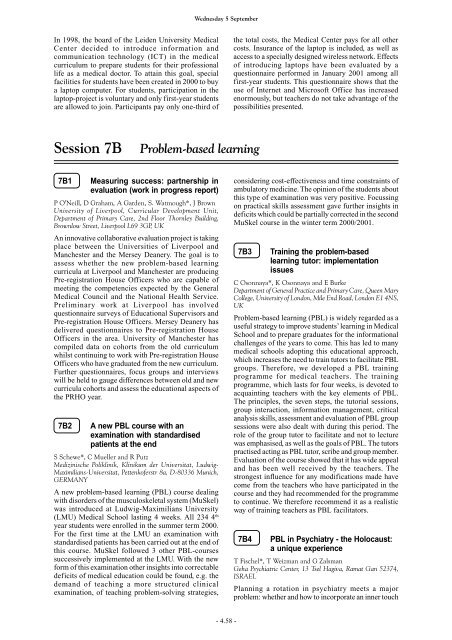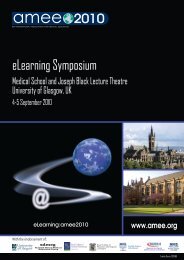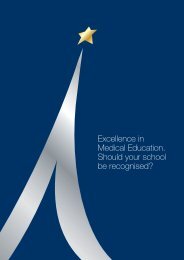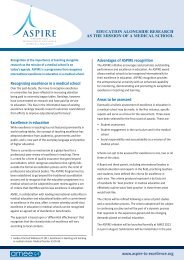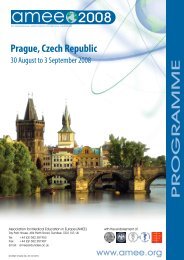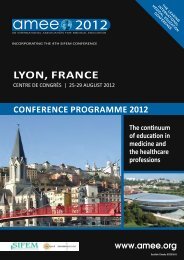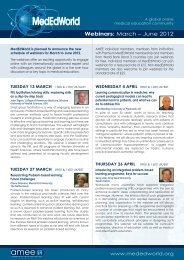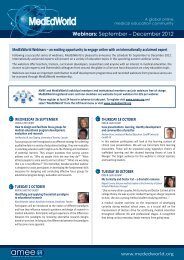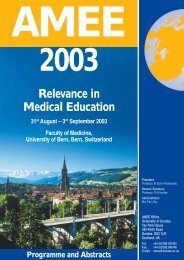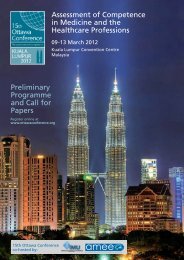AMEE Berlin 2002 Programme
AMEE Berlin 2002 Programme
AMEE Berlin 2002 Programme
You also want an ePaper? Increase the reach of your titles
YUMPU automatically turns print PDFs into web optimized ePapers that Google loves.
In 1998, the board of the Leiden University Medical<br />
Center decided to introduce information and<br />
communication technology (ICT) in the medical<br />
curriculum to prepare students for their professional<br />
life as a medical doctor. To attain this goal, special<br />
facilities for students have been created in 2000 to buy<br />
a laptop computer. For students, participation in the<br />
laptop-project is voluntary and only first-year students<br />
are allowed to join. Participants pay only one-third of<br />
Session 7B Problem-based learning<br />
7B1 Measuring success: partnership in<br />
evaluation (work in progress report)<br />
P O’Neill, D Graham, A Garden, S. Watmough*, J Brown<br />
University of Liverpool, Curricular Development Unit,<br />
Department of Primary Care, 2nd Floor Thornley Building,<br />
Brownlow Street, Liverpool L69 3GP, UK<br />
An innovative collaborative evaluation project is taking<br />
place between the Universities of Liverpool and<br />
Manchester and the Mersey Deanery. The goal is to<br />
assess whether the new problem-based learning<br />
curricula at Liverpool and Manchester are producing<br />
Pre-registration House Officers who are capable of<br />
meeting the competencies expected by the General<br />
Medical Council and the National Health Service.<br />
Preliminary work at Liverpool has involved<br />
questionnaire surveys of Educational Supervisors and<br />
Pre-registration House Officers. Mersey Deanery has<br />
delivered questionnaires to Pre-registration House<br />
Officers in the area. University of Manchester has<br />
compiled data on cohorts from the old curriculum<br />
whilst continuing to work with Pre-registration House<br />
Officers who have graduated from the new curriculum.<br />
Further questionnaires, focus groups and interviews<br />
will be held to gauge differences between old and new<br />
curricula cohorts and assess the educational aspects of<br />
the PRHO year.<br />
7B2 A new PBL course with an<br />
examination with standardised<br />
patients at the end<br />
S Schewe*, C Mueller and R Putz<br />
Medizinische Poliklinik, Klinikum der Universitat, Ludwig-<br />
Maximilians-Universitat, Pettenkoferstr 8a, D-80336 Munich,<br />
GERMANY<br />
A new problem-based learning (PBL) course dealing<br />
with disorders of the musculoskeletal system (MuSkel)<br />
was introduced at Ludwig-Maximilians University<br />
(LMU) Medical School lasting 4 weeks. All 234 4th year students were enrolled in the summer term 2000.<br />
For the first time at the LMU an examination with<br />
standardised patients has been carried out at the end of<br />
this course. MuSkel followed 3 other PBL-courses<br />
successively implemented at the LMU. With the new<br />
form of this examination other insights into correctable<br />
deficits of medical education could be found, e.g. the<br />
demand of teaching a more structured clinical<br />
examination, of teaching problem-solving strategies,<br />
Wednesday 5 September<br />
- 4.58 -<br />
the total costs, the Medical Center pays for all other<br />
costs. Insurance of the laptop is included, as well as<br />
access to a specially designed wireless network. Effects<br />
of introducing laptops have been evaluated by a<br />
questionnaire performed in January 2001 among all<br />
first-year students. This questionnaire shows that the<br />
use of Internet and Microsoft Office has increased<br />
enormously, but teachers do not take advantage of the<br />
possibilities presented.<br />
considering cost-effectiveness and time constraints of<br />
ambulatory medicine. The opinion of the students about<br />
this type of examination was very positive. Focussing<br />
on practical skills assessment gave further insights in<br />
deficits which could be partially corrected in the second<br />
MuSkel course in the winter term 2000/2001.<br />
7B3 Training the problem-based<br />
learning tutor: implementation<br />
issues<br />
C Osonnaya*, K Osonnaya and E Burke<br />
Department of General Practice and Primary Care, Queen Mary<br />
College, University of London, Mile End Road, London E1 4NS,<br />
UK<br />
Problem-based learning (PBL) is widely regarded as a<br />
useful strategy to improve students’ learning in Medical<br />
School and to prepare graduates for the informational<br />
challenges of the years to come. This has led to many<br />
medical schools adopting this educational approach,<br />
which increases the need to train tutors to facilitate PBL<br />
groups. Therefore, we developed a PBL training<br />
programme for medical teachers. The training<br />
programme, which lasts for four weeks, is devoted to<br />
acquainting teachers with the key elements of PBL.<br />
The principles, the seven steps, the tutorial sessions,<br />
group interaction, information management, critical<br />
analysis skills, assessment and evaluation of PBL group<br />
sessions were also dealt with during this period. The<br />
role of the group tutor to facilitate and not to lecture<br />
was emphasised, as well as the goals of PBL. The tutors<br />
practised acting as PBL tutor, scribe and group member.<br />
Evaluation of the course showed that it has wide appeal<br />
and has been well received by the teachers. The<br />
strongest influence for any modifications made have<br />
come from the teachers who have participated in the<br />
course and they had recommended for the programme<br />
to continue. We therefore recommend it as a realistic<br />
way of training teachers as PBL facilitators.<br />
7B4 PBL in Psychiatry - the Holocaust:<br />
a unique experience<br />
T Fischel*, T Weizman and G Zalsman<br />
Geha Psychiatric Center, 13 Tsel Hagiva, Ramat Gan 52374,<br />
ISRAEL<br />
Planning a rotation in psychiatry meets a major<br />
problem: whether and how to incorporate an inner touch


